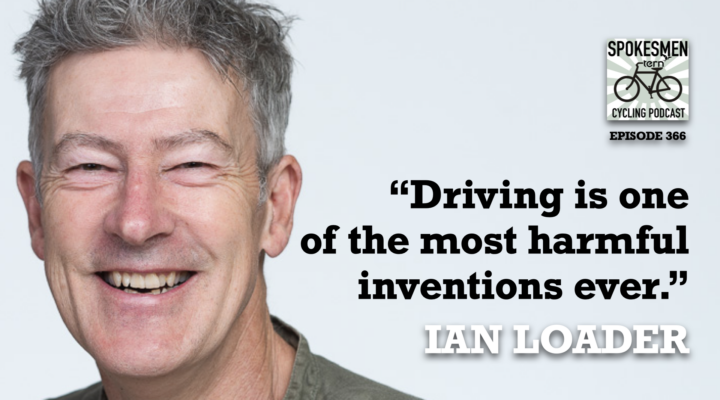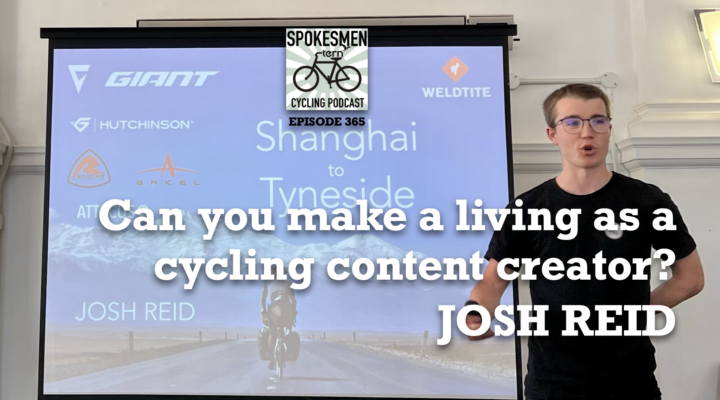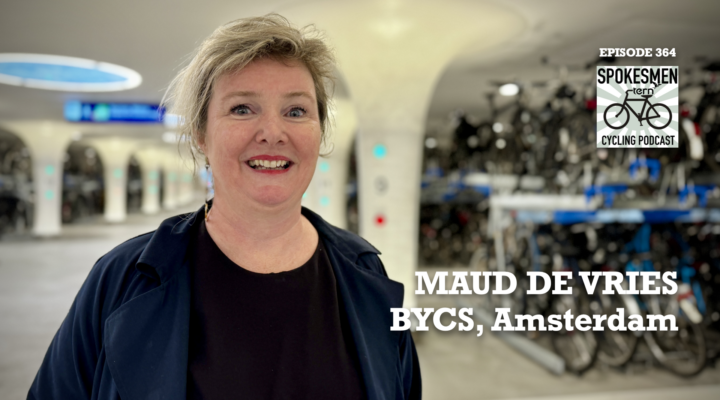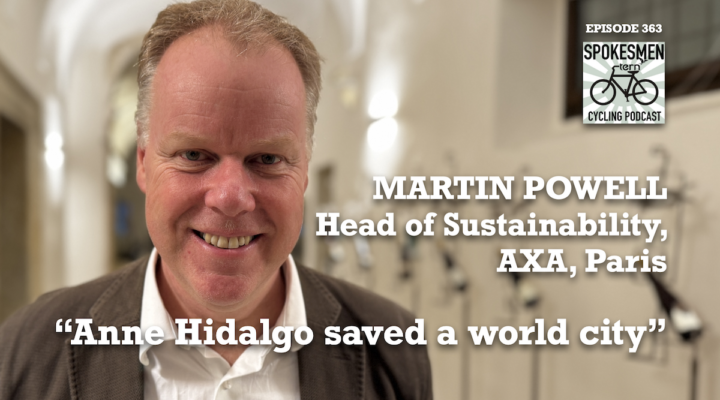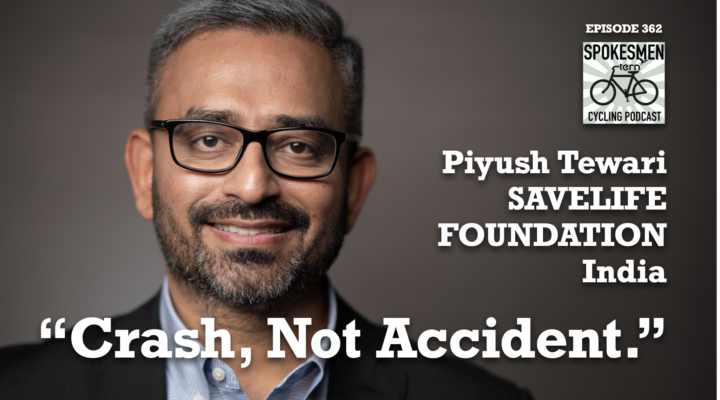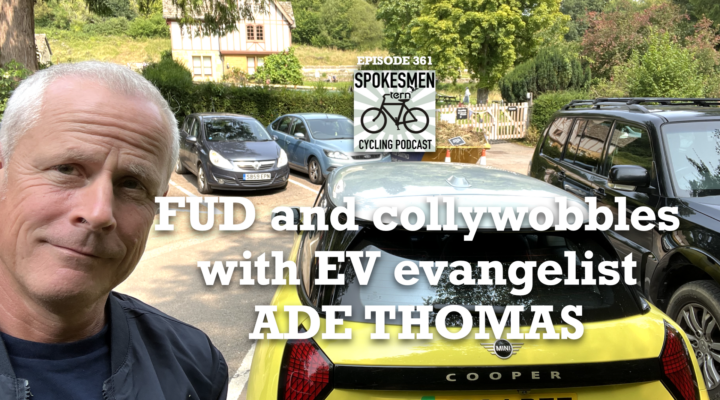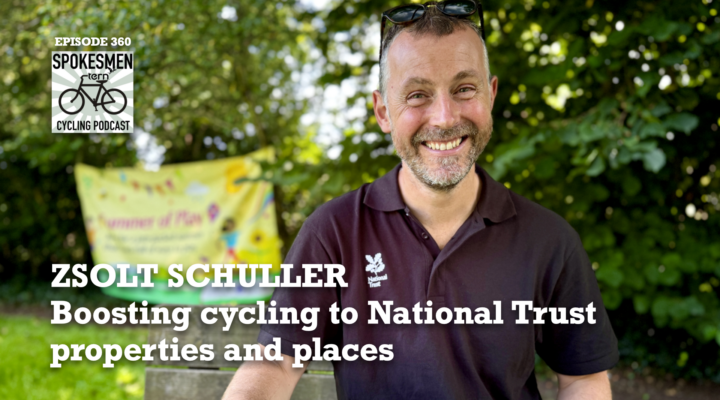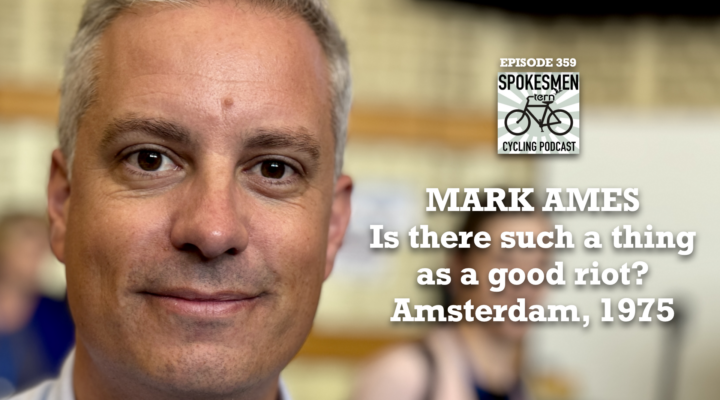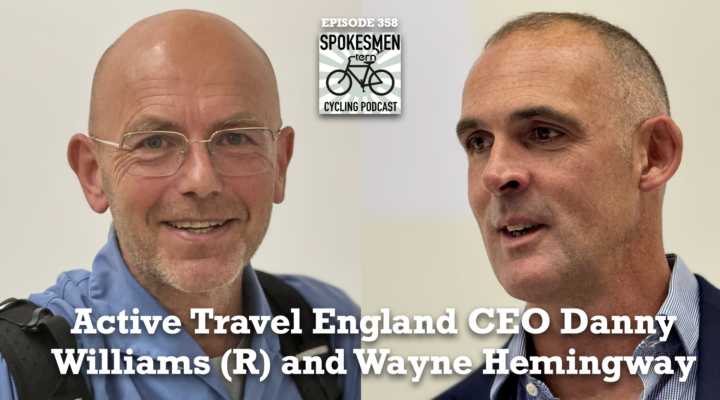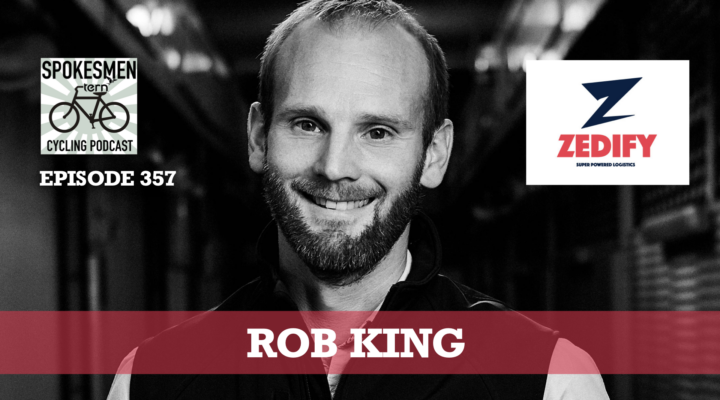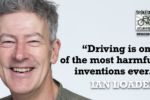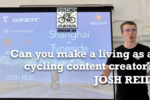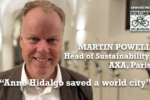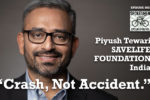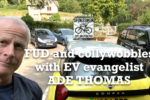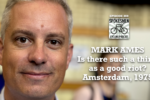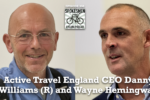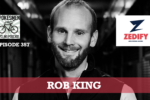5th September 2023
The Spokesmen Cycling Podcast
EPISODE 337: Cycle.Travel: In Conversation with Richard Fairhurst
SPONSOR: Tern Bicycles
HOST: Carlton Reid
GUEST: Richard Fairhurst
TOPICS: Interview with Cycle.travel routing website founder Richard Fairhurst.
TRANSCRIPT
Carlton Reid 0:13
Welcome to Episode 337 of the Spokesmen cycling podcast. This show was engineered on Tuesday 5th of September 2023.
David Bernstein 0:28
The Spokesmen cycling roundtable podcast is brought to you by Tern bicycles. The good people at Tern are committed to building bikes that are useful enough to ride every day and dependable enough to carry the people you love. In other words, they make the kind of bikes that they want to ride. Tern has e-bikes for every type of rider. Whether you’re commuting, taking your kids to school or even carrying another adult, visit www.ternbicycles.com. That’s t e r n bicycles.com to learn more.
Carlton Reid 1:04
I’m Carlton Reid. And over the next two episodes, uploaded at once, I talked to the folks in charge of cycle routing apps bikemap of Austria and cycle.travel of Oxfordshire. Episode 338 is with Bikemap’s Chief Operations Officer Bruna de Guimaraes , but this episode is a chat with Cycle.travel’s. Richard Fairhurst. Both interviews were done remotely with me firing up the desktop versions and playing with the smartphone apps. So here’s Richard …
Richard Fairhurst 1:44
Yeah, so I live in this place called charlbury which is about 20 miles outside Oxford, just on the edge of the Cotswolds. And it’s lovely this was held on the National Cycle network, which is always good also has a train station, which is good for somewhere this size. I think Mr. Beeching must have overlooked us somehow. But yeah, lovely place and very cycling friendly,
Carlton Reid 2:06
Which is like kind of helps what you do then.
Richard Fairhurst 2:08
Yeah, totally, totally. And it’s, it’s always been. I mean, obviously, Oxford and Oxfordshire is a bit of a hotbed of cycling in a lot of ways. But yes, as I say, we have a National Cycle network routes going pretty much past my house. And that was actually something that I was involved in setting up. I’m a sauce trans volunteer, in this part of the world and helped design the route. And one of the things I’ve always tried to do with cycle travel is have it so that it will find you a route which is good, as good as a human designer, that if you want to go from I don’t know, Oxford to let’s say Coventry or something like that. And no one has set out a route that goes that way, then within the confines of the infrastructure, it should find you the best route possible. At least that’s the plan.
Carlton Reid 3:01
So in another hotbed of cycling, Cambridgeshire, you have Cyclestreets, and Cyclestreets that I know, cuz I used them for my the bike hub app many, many years ago. Now that that cleverness comes from the way that it routes. So it’s the routing engine is the real powerhouse there. And lots of sites and lots of maps have used that routing engine for their own apps, but you’ve clearly using OpenStreetMap. We’ll get into that in a second. But so how are you physically generating the route? So when you said that it’s like a human? How do you make your routing engine like a human?
Richard Fairhurst 3:44
OK, so this is an interesting one. So I think cyclestreets, I have huge amounts of time for. I know, Martin quite well. And we’ve worked on a couple of projects together. There, their angle is more towards commuting, and practical, everyday cycling, cycle travel, you can use it for commuting, and people do. But it also has really quite a strong tilt towards leisure cycling, and touring and longer rides like that. So if you are going from landscapes join groups, then cycle travel will find your good route. If you go from New York to San Francisco, it will hopefully find you a good route. But as you say, it’s all about the routing engine. The routing engine effectively with any route planner is a set of opinions. It’s a set of opinions about which road is good to cycle on and which one isn’t. cycled travels, opinions are obviously very much aligned to mine. But also, I’ve been involved in OpenStreetMap for 19 years now, pretty much since the first few months of the project, and know how the data works there quite well. So there’s a lot of sort of little things there. I think you know, if we’re going along a track in France, and it’s rated as a grade two track, well, actually the French mappers are a bit more, a bit more optimistic about the state of the unpaved tracks and the British mappers. So let’s mark it down a little bit, because yeah, that’s how they map things in France. So it’s the sort of the accumulation of all of that sort of knowledge. Pretty much gives cycled travel. It’s its personality, but also its opinions on what sort of route to follow.
Carlton Reid 5:28
So clearly, cyclestreets, the streets part is the clue there. And the dot travel is the clue there. So that’s, that’s, that’s how you’re differentiating is just your more long distance in effect?
Richard Fairhurst 5:40
Yeah, absolutely. Yes, it’s very much just says on the tin. And I remember the first time in sort of first couple of years at the site that someone emailed me and said, I’ve just used it to plan a route from Shropshire to Rome, was absolutely great. It took me down to farm track in France, which I would rather not have cycled longer apart from that it was spot on. And I thought, yeah, okay, this is what it’s meant to be about. This is the idea.
Carlton Reid 6:04
And if you’ve spent nearly 19 years on OpenStreetMap, you’re nearly on 10 years for cycle.travel. So 2014 is one of the first references I can find online. Maybe you were doing before then. So is that 2014 When you started or was it bit before it was end of 2013.
Richard Fairhurst 6:22
So a little bit of background. This is kind of it’s a bit of a change of career for me. Before this, I was a magazine editor used to editor magazine called Waterways World, which if you know anything about canals, boats, rivers, that sort of thing you may have stumbled across. And boating waterways is always something I’ve done. And for one of the magazines I’d worked for, I’d got into the habit of drawing the maps for it, because we needed a map to show where the canals went. And I sort of fell into cartography that way. And from there, it was a reasonably obvious thing, because I love cycling, I always love cycling, to start to draw cycle maps. And as I went along with a, it may be I can make a bit more of a career out of this. But also, I see these routing sites out there, I see that you can ask Google or whatever it might be for a route from Oxford to Woucester, and it’s not the route that I would want to cycle along. I do not feel happy with choosing the routes that it’s selected. So I’m going to have go to my own. And it’s absolutely taken off from there. And I’d be delighted with how much people enjoy it.
Carlton Reid 7:31
Hmm. And there’s also Heritage magazine. You had a So describe that directory waterways World Heritage magazine. It did you train in that did your How did you get into that didn’t get in to begin with?
Richard Fairhurst 7:47
Okay, so age 14, or 15 or so I was your archetypal 1980s, computer geek. And I had a Amstrad home computer, you might remember those, not that dissimilar to spectrums, and things like that. And I had to play around with it as teenagers tend to and got reasonably okay programming things on it. And for three, one thing or another, I ended up being the freelance technical writer for a magazine called Amstrad Action. And Amstrad Action has a bit of cycling connection in this it was the first magazine ever published by Future publishing, itt started the entire company off. And obviously, they went on to do Cycling Plus, mountain bike magazines, and cyclingnews and things like that. So that’s all I’m selections fault. Ultimately, I then went off to university, but I got started in, in journalism after this. So it came as a reasonably obvious thing to do, after university to go for jobs on magazines. I already had this on my CV. And because I enjoyed boating, I went to the canal magazines. First of all, I then spent a while, as you say, editing heritage magazine, which was a sister magazine to the canal magazine that worked out at the time. And that was an interesting experience. Because you think, okay, heritage magazine, it’s all about going around the countryside and country houses and that sort of thing. It must be quite a nice fluffy thing to work on. And it is. But on the other hand, actually, 90% of the readership were Americans, and they knew a huge amount about country houses and about Shakespeare and all of that, you know, this was their identity. They loved the old country, as it were. And I’ve never been that great on Shakespeare, to be honest. So I spent a few months there and it was good fun. But I said after that, I’m going going back to the canal, some controversy about canals, because I know about that.
Carlton Reid 9:41
On your on your site, you describe yourself as an Open Street Map. OpenStreetMap. Activist, so that’s not just a contributor. You’re a bit more than just a contributor on open streets. I was trying to find out the segway from Heritage Magazine. Then waterways world into how you got into being quite active on the OpenStreetMap. Community. Yeah.
Richard Fairhurst 10:07
So as you say, I have spent all this time with cycling magazines and waterway magazines and then got into drawing the maps for them. And there’s always been a problem with any map that you’ve got to get the source data from somewhere unless you literally go out and survey absolutely everything yourself, which gets impractical when you’re doing a whole new canal every month, then you’ve got to get the data from somewhere. And in historically, in Britain, you would get it from the Ordnance Survey. And at the time, Ordnance Survey would basically charge you through the nose through any data that they might daintily have. They’re so much better now. But that was the case back then. And I kind of worked out that, well, the thing about canals is they haven’t moved much. Most of them were built before 1850, I can find some old maps out of copyright. And I can just trace the canals off there. And we’re fine, we bought them suddenly got all sorts of data. So this became, this became a little bit of a project. And I ended up collecting the entirety of the Ordnance Survey one inch maps of England and Wales for the 1930s and 1940s, which was at the time, the last set that were out of copyright. So I found a place that would scan stuff in bulk for you, and said, you know, will you be prepared to scan this? And they said, Yep, two quid a map, we’ll do it. So I gave them 150 maps, they gave me a DVD with scans of the board on which was quite something. And then this guy called Steve Coast started OpenStreetMap. And all of a sudden, I think well hang on. This is a it’s a really interesting project for what he’s doing. But also, I’ve got all these old maps. And it’s not just canals that haven’t moved. Most of the railways, lots of country roads, lots of rivers, obviously, maybe this would be an interesting angle to work together on this. So this was about four months after OpenStreetMap had started. I said, Okay, I’m interested in maps, I’ve got this sort of stuff going on. I’d like to be part of this. And so I’ve been asked that as part of OpenStreetMap from its very early days. And in the first year, we literally had about six or seven or eight paths and roads in Regent’s Park. And that was the sum total of the world map. And now it’s everything is everything everywhere. It’s astonishing how it’s, and I think he did my great surprise for how the project was taking off was, I don’t know, maybe sort of seven or eight years into the project, I went on holiday to China. And it was one of these sort of things where, obviously, you’ve got fairly limited freedom of movement there. But we it mean that we had good guests, good guides, and a good itinerary planned out and all of that. And we were walking on some fairly obscure paths in a rice farming area. And the Chinese government is very anxious about people surveying their country, they don’t like it too, you know, you’ve got to have all of these permits to allow you to do this, and they don’t get permits to OpenStreetMap volunteers. And so this, this is a bit of a problem. But as a good OpenStreetMap activist, I can’t not survey where I’ve gotten here. And this is unthinkable. So I had little Garmin GPS recording a track tucked into my side pocket hoping that no one was going to notice it. And okay, fine, I do that I get a bunch of railways as well, because we travelled around by train, get all of this stuff, go back home ready to upload this into OpenStreetMap ready to map it. And I find out this already been done. It’s already been done by a bunch of Germans who’ve been to China on holiday and have done all of this six months a year before me at that point, I thought well, you know, okay, this is taking off. If even these remote places in China, where you go to are being mapped by volunteers, then this is really gonna go somewhere. And it has you know, now, now Facebook now Microsoft Now Amazon, all of these big companies use OpenStreetMap and that’s the thing we started building 19 years ago.
Carlton Reid 14:09
And then you’re talking about the effect. We’re a bit of a word a bunch of geeks basically. You know, taking GPS tracks and then uploading and then digitising etc, etc. So they tend to be geeks. I think I can’t be too but doing all effort as a volunteer you know, that’s very that takes a lot of time. Obviously a lot of expertise. But then you’re translating that into into a business. So with with your with cycle dot travel. And why did you charge so why why is cycled not travel, not charging and other other navigation sites, websites and apps that are bike friendly? bike friendly routing,
Richard Fairhurst 15:01
they do charge. So why don’t you charge, I could talk for hours about cycle navigation apps, business models is a fascinating subject, or at least its history. So if you look at the really big guys, then you look at people like Strava, or commute or whoever it might be their, you know, their business model, as you say, it’s very much based on charging, the standard thing for this sort of site is that this sort of app in particular, is that you pay five pounds a month, and get turn by turn routing, and you get offline maps and things like that. Now, the thing about Stryver and commute is they have got a staff of 1000s of think commuter employ about 120 people, they have got marketing budgets, commensurate with that, these are the big guys, I am me sitting in a little converted barn in the back of my house in Charlbury, I can’t compete on that level. So I’m not going to fight that game. Instead, what I try and do is say, Okay, I’m going to put this up there, I really hope that it finds good roots for people, I find, I hope that someone who was going to use it to go from Shropshire to Rome, or just had someone going across America with it, we have people doing routes across France across Britain all the time, I hope that people will do that, find a good route and be so happy with the site that they choose to donate. So what you can do with cycling travel as you can become a supporter, you can give two pounds a month or five pounds a month, whatever you see fit. And you know, you didn’t get a few extra baubles for that you get a few maps, which I have to pay for. So Ordnance Survey maps, IGN in France, that sort of thing. But by and large, it’s largely the same. But I hope that people will be sufficiently happy with the site and with the routes that it finds support them, that they will choose to support it. And they do. You know, others now, hundreds of people have signed up to become supporters of cycle travel, it pays its own way in terms of service costs. And all of that is getting towards paying its own way. In terms of my time on it, I think I’m not that far off. And that that’s brilliant, because it means I can spend more time doing what I love. And it means that people get great holidays, great bike routes. So that’s absolutely what I’m in it for.
Carlton Reid 17:24
So, as you said, there are quite a few other sites and apps out there. What are they doing? Well, and what are they not doing? Well? Can you can you be rude in that way?
Richard Fairhurst 17:38
Okay, so Well, I’ll tell you the easy one, which is the site that I have absolutely the most respectful and that’s Ride With GPS, I think they are brilliant. They really know their audience. Their proposition is quite different from what I do. Their proposition is more about organising routes, saving routes, saving rides. They’ve got an absolute suite of editing tools for your groups, all sorts of things that, you know, I would never dream of doing a month of Sundays. I think, you know, obviously, I am biassed, I think their core A to B routine is not as strong cycle travels, it will put you on a busy road more often than I do. But I think you know, for their audience, what they do is absolutely fantastic. They’re bootstrapped. They haven’t taken external funding. They’ve got a small team of about I think 15 to 20 people working in Portland in Oregon, now the great cycling city, and what they do is brilliant. So yeah. What I was gonna say, which is nice about other people, I mean, you know, both both Strava and commuter ecosystems, really Strava for a lot of people is cycling commute has all of this stuff where it gets you into their apps, and all of the safe, your highlights and all of that sort of thing. But which is the sort of thing you’ve got, you’ve got 120 people to do, and they pay influencers to go out and have great rides and say, does this with Caboose and that sort of thing. It’s a different level of doing things. And you know, I have plenty of time for them. As I say up cycled travels, strength, I think is the is the routing and the actual routes that it will find for you. But yeah, a lot of a lot of time for that. And of course, as you mentioned earlier, cyclestreets cyclestreets have been doing this for a long time longer than I have. They have absolutely got the city routing down to a tee. If you are going across London or Cambridge, then cyclestreets will find you a terrific route and always has done so. Yeah. And another obviously another great thing that cyclestreets does, is that they do a lot of advocacy, advocacy type work. They work with Robin lovely cert active travel England now they do stuff with local authorities. And in fact, the other year, I was involved in a project with them and TfL because TfL TfL a few years ago, spent, I think 2 million pounds on producing this cycle infrastructure database, which is this massive collection of data on every single bit of cycle infrastructure in London, it’s quite an endeavour. And this was fine. And they used it for their own purposes. And it was just sitting there and they thought, well hang on. If we get this data into OpenStreetMap, then we can actually get it out there and used by people. So you get it into OpenStreetMap, it then feeds into all the different mapping apps. And then people will start to be able to use this knowledge that TfL have gathered about where all the good infrastructure is. And so we spent a few months working on that it has started to filter through. And you will find now that most of the mapping apps, not just me, not just cyclestreets will now make better decisions in London as a result of this. And nice to follow up about this is that TfL, then, last year had a cycle routing Summit. And they invited me for cycle travel, Martin from cycle streets, and a bunch of other people from the big guys. So from Apple from Google, and such, like, and basically they put Martin and me up on stage and said, Okay, so this is cycle travel, this is cycle streets, they are finding good routes across London. And we would like you from Apple and you from Google to talk to these guys and find out how they’re doing it. Because they’re finding better routes. And we if we’re going to spend 2 billion pounds on building cycle super highways across London, we sure as heck want your apps to direct people to use them. And at that point, they weren’t doing it. I think Apple are doing quite interesting things with cycle boosting in cities. And they’re starting to do that. Google, I mean, Google have a product for cycle routing, but it’s it’s tuned to San Francisco, and it doesn’t necessarily work that well in the rest of world some places it does. So
Carlton Reid 21:45
you’re right. I mean, Apple, Apple is doing some very interesting things, obviously have got very deep pockets. And and can do interesting things. Do you think even with the deepest pocket in the world, you’re never really going to catch up with OpenStreetMap? Or do you think something like Apple could, you know, the way that they’re mapping everything that satellites, you know, they’re sending cars round, they’re sending bikes round and pedestrians round a bit like Google Streetview are doing? And then everything is, you know, obviously read so you know, you’re getting the speed limit is read from the round holes that the cameras are that AI is spotting, or do you think there’ll always be something about the crowdsource nature of OpenStreetMap that will always be done that how much money you pump into a map? Absolutely, yes.
Richard Fairhurst 22:36
OpenStreetMaps great strength is that it is an agglomeration of local knowledge. Basically, every single contributor brings their local knowledge to the map. So if you know about a little cut through, then you put that into OpenStreetMap, it might only be 1050 metres between two streets, but it could save two miles off a bike route. And that goes in that instantly makes everyone’s ride better. It’s very, very difficult for even the best street view cameras and AI processing to pick up that level of detail. And so I think OpenStreetMap has always got that knowledge, but also OpenStreetMap is, to large extent built by cyclists. Certainly in Britain, we found that a lot of the earliest OSM contributors were cyclists who wanted a decent map for cycling, and couldn’t get on anywhere else. It’s really notable that one of the earliest breakthroughs of the project was when that smart smart guy figured out how to reverse engineer the mapping format for Garmin GPS. So within a few months of this, people had got OpenStreetMap on their Garmins as the base map all of a sudden, and it had all of these cut throughs in and it had the MCN. And they had all of this sort of thing. And that obviously that then made people’s bike routing experience the cycling experience so much better. And I think it’d be very, very hard for Apple or Google with all the AI in the world to catch up with that they will be able to give you the best freeway routing experience in San Francisco, because they’ve got, you know, surveying cars going along with caught with cameras on every single angle. But they didn’t put that sort of effort into cycling. And last week, I think it was actually on one of the Silicon Valley Tech forums, there was an anonymous poster from someone who used to work for Google Maps, saying, Yeah, I used to work there. And I tried to put a bit more effort into the cycle routing, and he got stomped on from on high for privacy reasons. They said, No, we can’t really do this. And they don’t work there anymore. And they said, you know, cycling isn’t really a priority for Google to be honest. It doesn’t make them a lot of money. They are ultimately a self driving car company these days. OpenStreetMap is to a large extent Made by cyclists, it’s in our interest to make the routine better.
Carlton Reid 25:02
Hmm. So, with your Heritage magazine background, I don’t know how much you know about cycling history. But of course, cyclists have always been really keen on mapping. You know, the the Bartholomew maps, the cyclists are very interested in the, you know, the, the route books that cyclists created in the 1870s 1880s, that incredibly interested in, in road surfaces. And I’ve written whole books about this. Very interested, but it just in mapping in general, so like the CTC work, such as Touring Club, as was very, very involved with the mapping companies. One of the maps I used in my book was a, which were the CTC was heavily involved with for a long time. And was you basically using crowdsourcing to do this an early version of Open Street Map, where they were where they were mapping road surfaces. So there was a there was a batholomew map where every single street surface was mapped. And if you look at the bottom, we oh, how was this mapped? It was done by cyclists who were then contributing, you know, their information to the local council. He was then putting it or she was probably he was putting it through to Bartholomew. And then they produce these incredibly detailed maps of you know, here’s where the tarmac was, here’s where the asphalt or here’s where the macadam was, here’s where the wooden streets were. And it’s these incredibly dense, almost Open Street Map dense maps of London and done by cyclists in the 18 1890s. So you are in a rich tradition there, Richard?
Richard Fairhurst 26:47
Absolutely. And that’s, that’s terrific. Because, again, it’s looking at cycling has never had the money that’s behind the auto industry. If you are Apple or Google, then it’s in your financial interest to plough huge amounts of money into into car routing, because that’s where the money is. Cyclists, as you say, do it for themselves and always have done and I think OpenStreetMap is a great example of that. We found in the early days in Britain, that actually cyclists were keen on it the walkers because walkers have always had fabulous maps in Britain, they have the Ordnance Survey, and we’ve always had a bit of resistance there you see, say to people come and contribute to OpenStreetMap. You can put all your favourite hiking paths on it and say, Well, why would I want to do that? I’ve got an OS map, where a cyclist got it from day one. They knew that there was nothing out there at the time. That was giving them a decent map. And so yeah, right, I can get this I’m going there to put all my favourite roads in it.
Carlton Reid 27:46
I’m going to I’m going to go across to my colleague in America right now for a brief interlude, a commercial interlude. However, when we come back, I would like to you basically you talk me through how to use the online version and the the one that I’ve got on my, my my smartphone, my iPhone. So take it away, David.
David Bernstein 28:10
This podcast is brought to you by Tern bicycles. The good people at Tern understand that while a large cargo bike can carry oodles of stuff, many of us prefer something a little more manageable. That’s why they’ve come up with the HSD e-cargobike for folks with big aspirations to go car free, delivered in a compact size, with its rear shock, 280 kilos, and a combined hauling capacity of 180 kilos. The robust new HSD is stable and easy to manoeuvre, even when under load. And with its Bosch eBIKE SYSTEM tested and certified to meet the highest UL standards for electric and firesafety you’ll be able to share many worryfree adventures with a loved one whether it’s your kiddo or Nan. Visit www.ternbicycles. That’s te r n turn bicycles.com to learn more.
Carlton Reid 29:09
Thanks, David. And we are back with Richard Fairhurst. And before David’s ad break bear or David’s not his ad break but Tern’s ad break narrated by David thanks so much, David. I was asking Richard if he would guide me. So give me so on the on the on the website. And on the the app. There is a section which actually says how to use the app and you can drill down but can you and this is like the end of the world of radio here. So it’s difficult it’s not visual but just if you can basically take what what do I start with? What what are the things that as an absolute beginner when I’m opening up either on the desktop or on the smartphone? What should I be looking for and give me some tips on being a power user give me straight into being a power user. That how you would use this app when say you reach your either plan, give me two versions, where you are planning say a holiday somewhere you’ve never been to before. And when you physically there on the ground with your smartphone, so give me the power user tips give me give me the the startup guide, even though this is purely audio and not visual.
Richard Fairhurst 30:27
Okay, so cycle travel, the URL that you type into your web browser is simply that it’s just cycle dot travel, or you can google it of course, and you go straight there to the homepage, and it will give you two boxes where you type in where you’re going from and where you’re going to. So I am sitting here with a site now I shall type in classic test that I’m going to go from Land’s End it autocompletes it so that’s fine says it lands in Cornwall, UK, UK name John O’Groats and actually second walked out on the group’s Caithness Scotland. That’s what we Yeah, so I do that it has found me a route. And you will see that the route opens up on the map, you have got the lines there with mile markers every 100 miles. It says it’s 992 miles, which sounds about right, you’ve got a bunch of little tools that you can use to play around with the route on the left, but the core of it is on the right. And that’s it’s broken it down into the various different types. So it says your 71% on paved road 14% on paved path, you’ll notice that only 8% on busy roads. And this really tells you about the sort of routine that cycle travelled likes doing, people will cycle from lands and xiana groups and spend 100 Miles going up the marches on day 49, non intimate, that sort of thing. It’s all about quiet roads, things like old railway paths, decent quality tow paths, that sort of thing. So it has found this route. The power user tip, and you can go absolutely wild with this is that you can then drag it. So you get your mouse you hold the mouse down on a bit, and then you drag it to where you want to go. So let’s say I want it to go through Oxford, I have just done that. And it has now found me the best route it can from Land’s End to John O’Groats via Oxford, and either via point has little one on it. So that is the first via point. Let’s put another one in, we’re going to go through Lincoln. Number two, you can put up to 200 in there. And people do I have seen the most amazing intricate routes that people will plot with that. And that’s that, okay. So what we can then do is let’s have a look at this. It’s 1074 miles. Now, you’re not going to cycle that in a day, I realised that we’re recording this a few days after Paris-Best-Paris, and there are people listening who probably do this sort of thing in a few days. But I’m not going to do this in a day, certainly. So you will see on the left this it says under route summary total length of 1000s centrical miles suggest overnight stops. So to click that. And it suggests that if we’re taking an average distance per day of 60 miles, then we can do it in 18 days, and there’s a little button on either side of 18 days, we can make that a bit shorter or longer. So let’s take it down to 14 days, because that’s kind of common way of doing lands and junk routes. And okay, that’s taken us up 77 miles a day. Let’s say we’ve got to get the train to pens amps on the first day. So that’s going to reduce our cycling time there. So we take a short first day, that’s fine, take split. And you will see that it’s put these points along the way, each of which has got a little moon symbol on there overnight stops, and five points as well. So you can drag those around. And you’ll see. So it’s suggesting places we might want to stop one of those, let’s say let’s have a look in it’s found walnut, which is between Bridgewater and Glastonbury, which sounds like a nice part of the world. So what I’m going to do, I’m going to click that on the map, and you’ll see a little bubble pops up. And it says, Okay, this is a via point. It’s on a minor road, we know all that sort of stuff. And you’ll see a bunch of links for stuff you can do there. One of those links is nearby accommodation. So I’m going to click that. And you see there are a bunch of icons show up and those are for campsites and for Bnbs and for hotels that are near the plates we’ve selected. You can turn different types of those off. So I’m going to say I’m I don’t want I don’t want chain hotels. I want individual ones. That’s good. So here we go. We have found Sunnyside Bed and Breakfast. That sounds nice. So I click that. It brings up this window about it. I can check availability and book, click through on that. And that takes me straight to to booking.com and that will give me a chance to book that for whatever days I’m interested in. So I can clear that out the way something that people are always He’s interested in is elevation, how much climbing you’ve got to do. And cycle travel, of course has an elevation graph. That’s one of the icons on the left. So I’m going to click that Show elevation. And it comes up with the elevation graph. What is important here is that it is broken it down into every individual day. So I can see that, for example, on the second day, because we’re going through Cornwall and corners like that. We’ve got 1700 metres of elevation. So that’s going to be a tough one. Take your mouse along there, click on an individual point. And it will take you to that particular point on the back, I recognise that I’ve written that several times. That’s the place just above camelford, where it’s sort of an old air base, and you’ve got this dead pancake pancake straight road at the top of a hill. And there was always a headwind, seriously, it must have written that three or four times and there was always a headwind. So you can find your way through the route like that. You’ll also see if you click anywhere on the route doesn’t have to be via point, you can just click anywhere on the blue line. Then, when the window comes up, within two pop up window, you’ve got two things at the bottom one says find photos. And the other says Street View, Street View is fairly self explanatory, that will open Google Street View at that particular place. So if you’re not sure about what the route is going to be like, you can eyeball it before you set off. Obviously, the disadvantage of Street View is that Google sends its Street View cars along roads, it doesn’t send the belong tracks or cycleway that often. So there’s also see photos, click that and you’ll hopefully find a bunch of photos crop up especially on right aways, railway paths, that sort of thing. And so you can have a bit of a look at what the surface is going to be there. And that comes from an absolutely fantastic project called geo graph, which is another crowd sourced based collection of photos from people who have been taking pictures of every single part of the British Isles for, again, 20 years now. So that’s where that comes from. I said blue line earlier, it’s not always a blue line, sometimes it’s a green line. And when it’s a green line, that’s because it’s an off road section. an unpaved section, I should say. So you might find occasionally that will take you along a Canal Towpath, it will try and keep you on two paths and railway paths that are a reasonably good cyclable surface. You know, I absolutely cringed when I think Google Maps first brought out cycle routing, they spoken to the canal and river trust and got their towpath data. And so it sent you a long tow patter every single opportunity including the shops union Canal, which is anyone who cycled it will know is basically a reenactment of the Somme it’s just a quagmire for miles on end. And so you know, toe pattern if it was the same cycle travelled twice to send you along the good ones and not the bad ones. But all of this to say it’s a fairly balanced type of route choice. It likes quiet roads in like scenic roads, it likes good quality tracks, you can also choose a couple of other route profiles as it were the one which is gravel cycling, and that will accentuate the off road again, you know, it will try not to send you on absolute quagmires.
This depends how much data there is an Open Street Map about surface quality, but where it knows these things, it will try and do that. There’s also a paved option that you can choose. And that will try and keep you on paved roads, or paved psychopaths whenever it can, for a bit of in subsidy routing, as well. There’s also a nighttime option. And this is fairly new and experimental. But what that will do is try and keep you on roads and paths that are going to be well lit. And so I think this came actually from an idea I think it was Ruth Hannah McQueen had on Twitter, she said, You know, I want to go cycled back from places in London in the winter. And I don’t particularly want to cycle along the Regent’s canal or across various parks in in winter. And I totally get that you know, it’s cycling supposed to be enjoyable and and part of being enjoyable is safe. So the nighttime option will try and keep you off that sort of thing. But you’ve got those those four options. If you’re using it in different parts of the world, you might not have all of the options. So I don’t do gravel routing in the state as yet, but it’s there across Britain and Europe. What else can I tell you, I think the other the other thing, let’s clear our vans into junk routes route out the way. The other thing that I would highlight is that it’s not just about a to b routing. You can also do a to b and back to A so that’s a round trip. And so let’s say I’m going to go from childfree to Banbury for an afternoon ride. So I click the two places on the map or type them in in the search boxes. And that has found the a 90 mile route. That’s fine. I now have to get home again. I would like to get home a different way. So I click the round trip button and it has found me in a slightly different way, on the way back, it’s cleaving slightly less closely to the nCn. At this place, at this case, few different countries, it’s still the same sort of route, but get so you’ve got a different experience on the way in and out. What you could also do is just click once or type of place wants to set your start point, and the little green point will show up, that’s your start, and then click suggest a ride. And if I do that, then it’s got three circular routes that have come out, come up, or from childfree, or around 25 Miles 1921 27, in this case, and they are round trip routes, which will again try and stick to country lanes and quiet roads. If I want to go for something a bit longer than there’s a slider, I can drag a drag it up to 75 miles. And it’s now sending me off into the Northampton countryside or off into the high Cotswolds and that sort of thing. And it’s found me a nice circular route for that. And that this was quite fun because I used to do this and I think it had a maximum of 75 miles. And I mentioned this to Jack first. And then he said, Oh, no, no, no, you’ve got to take it up to 200. So we can do the audax thing. So you can now take it up to 250 miles, and it will do your reading my readymade or tax that is for people who are harder than me, but it will do that if you want to. So there you go. That’s the that’s the whistlestop tour of the desktop website. If you set up an account, obviously, or free, if you set up an account on the website, then you can save your routes, you can put them in folders, all of that sort of thing. And the reason I mentioned that you can save your routes is that this then becomes useful if you have the mobile app. Now the mobile app, as you say, there is an app for the iPhone, there is one which is literally now in the last days of testing for Android. So this should be ready in the next few days, it may even be ready by the time podcast is edited, which you’ll see. And I’ve had supporters testing that for the last few months. And effectively, you can use the app either as simple ATB routing tool, so you can fire it up and say, I want to go from my current location to somewhere else. And so I’m gonna be here, Banbury, again, type that autocompletes in the app and navigate to bhambri. And it has found me a route from here to battery, that’s fine. But what you can also do is you can use it to navigate along the routes that you have saved from the website. So if I click the little routes icon in the app, then I’ve got all my folders here, let’s say what I’m gonna do, I plotted a nice circuit around Oxfordshire a few weeks back, I’m gonna click that. And that all appears on here. And it gives you turn by turn directions. So you can just put it on the handlebars, and it will say, okay, in how many metres you’ve got a turn coming up. So it says, Turn right here. And do that just the map follows you along. All of that, and, and nicely to fun detail about this on the iPhone app is that I I’ve got the app done. And I was pleased with it. I thought you know, okay, this is this is good. I can, I can have my cycling quality with this. So a couple of months after I finished the app, I went off for a holiday and I went and cycled the New River Seine recycled route from Paris to the coast. And it was brilliant. And literally the first time I used it in a French town, it started seeing turn left along Casey de la Republique way. And I thought, okay, I mean, I know my French is not brilliant, but that is the worst French pronunciation I’ve ever heard. And it’s because the phone has its own native language. And it reads everything out in that. So I spent a whole bunch of time trying to coax the phone, to work out what the native language was for the street name, and to get it to read things out in that. So now if you take the cycle travel app, and you go to France, and it will tell you turn left on then it switches into a French voice plus de la Republique, and so on. So it’s got all of these little tweaks that are meant to give you a more enjoyable cycling experience. A lot of the stuff from the website is also in the app so you can find accommodation, you can switch between the different route types as well. What you can also do in both the app and the website is that you can switch between between different base maps. So cycle travel has its own base map. As I say, I’ve got a bit of a sort of self taught cartography background so I designed something which I thought was appropriate for cycling so it brings in minor roads when you’re zoomed out a lot because that’s the important thing. You can’t see motorways,
Carlton Reid 44:35
so I’m not I’m basically looking at the map here. It’s like all weather motorways. Yes, I can if I if I click it and I can just about see them but they’re not they’re not prominent. Know Exactly,
Richard Fairhurst 44:45
exactly. It’s it’s trying to show you the stuff this is important. A cyclist but you can also choose a bunch of different base maps. So you get a few standard so there’s things like sort of obviously open street Heat Maps standard style, and a few others. But quite quite a lot of these are things that you get as a nice little bonus, nice little bobble, if you’re recycled travel support. So you get Ordnance Survey maps, because everyone loves Ordnance Survey maps, you get the equivalent in other countries. So you get IGN in France, you get things like open cycle map, a bit of satellite mapping all of that. And I find that particularly useful for the Ordnance Survey maps, because if I’m planning off road routes, then OSM doesn’t as yet have completely full coverage of vital ways. And by waste and things like that. It’s getting there, it’s getting much better. But for absolute completeness, you need Ordnance Survey. So I was the other day trying to trace out to the new cycling UK Snowdonia route. And there were a few tracks in that that hadn’t made its way into OpenStreetMap yet, so we’re gonna have a look at Oh, s Oh, yeah, go around the site of this mountain. And through that beautiful restrict an Ordnance Survey
Carlton Reid 45:55
that one of the benefits for tourists, to me as a Roman road geek would be, it tells you all the Roman road stuff. And it tells you this is a church and this is whereas OpenStreetMap, you know, doesn’t doesn’t have bound from it unless there’s a layer. I mean, you can certainly put layers on, but not like something that is there as a default, whereas Ordnance Survey has that benefit. And so but that’s basically what you’re saying is you’ve got it there. Yeah. If you become a supporter, you’ve got it there. And the benefit of the Ordnance Survey is there should you choose to go and get it?
Richard Fairhurst 46:32
Absolutely. And you know, lots of us have grown up with Ordnance Survey maps, they are evocative you, if you’ve spent, you know, your life reading our West maps, you don’t have to read them. They they kind of define the countryside in a lot of ways. And you’re just over to a part of Herefordshire and you look at this, and you can just see the image in your mind. And here we go. We’ve got Wellington marsh and answer bank and 118 foot spot height, metre spot height, that sort of thing. I think yeah, this is the definitive countryside map. And so I like being able to combine cycle travels routing
Carlton Reid 47:03
with so it’s already you’ve sold me, you’ve sold me on your project, how much do I pay
Richard Fairhurst 47:10
as much as you like?
Carlton Reid 47:10
I mean, I think the
Richard Fairhurst 47:12
standard thing that I say here is that you can support it as coffee or cake or beer, which are, you know, three classic cycling foods. And so the equivalent of buying me a coffee every month is two pounds, the equivalent of buying me a slice of cake every month is four pound 50 The equivalent of buying a pint of beer each month, well, you know, I live near Oxford, so it’s very, it’s that sort of thing. And I am, I am 100% comfortable with whatever feels good for you. If you want, if you want to support it for two pounds a month, that is absolutely brilliant. If you’ve had a terrific holiday with cycle travel, and maybe you want to give a bit more for a month or two, that’s fine. But you know, I’m I am honestly honoured by the by what people say about the site and how it has found them to have found good compensates for people. So whatever you feel comfortable with.
Carlton Reid 48:05
So you’re talking about people there. So you have a community on the site. So But basically, it’s not just you contributing advice, information, maybe even brickbat. So tell me about the community aspect of upcycle travel.
Richard Fairhurst 48:24
So I have, for example, a forum on cycle travel, just a substantive web forum where people can give feedback and suggestions. There’s also a place where you can post travelogue so if you’ve been for a ride, and you want to say a bit about it, upload a few photos, then there’s a place for you to do that. And I’m going to be building more on that in the next year. But what I also try and do is engage and support in other forums, other locations. So for example, on the cycling UK forum, there is now I think, 100 Page thread, which is all about cycle travel. And it started off with someone saying, Hey, I’ve just discovered this, and it found me a good route. And then as people have got into it, they have said, okay, yeah, it’s done this, or why did it send me that way? Or Could I could I maybe have this extra feature? So I’ve tried to, you know, interact with the community, wherever they may be, and have it have the app and the site evolve along with that. And to a certain extent now I think, you know, cycle travel is kind of the pet rooting app of the cycling UK forum, for example, because so many people there have said, Oh, this is great, but wouldn’t it be good if he could just do this? I think yeah, okay. I can make it do that. And it is very much meant to be that it’s meant to be something that reflects the way that this sort of this sort of cyclist enjoys riding. I’m not going to start developing stuff for the Strava crowd because it’s not meant to do that. It’s not meant to be about performance or athleticism. I think the Strava for that they do it much better than I ever would. But for tourists and for leisure riders and for people who like quiet routes to cities, all of that, then you know, I try to engage with people get their ideas, because I don’t have a monopoly on good ideas. There’s so much more that you get if you going out talking to people
Carlton Reid 50:17
where you’ve got a new supporter. So how quickly can how easy was that? And while you’re chatting there, the iPhone has done it because all like linked, and I’ve had to go across my bank, and okay, it, but you now have a new monthly supporter, you’ve sold a nice, terrific, thank you. So I will be using it, obviously, I think what you know where it sold me was the Ordnance Survey part. That’s the first example Hang on. You mean I can mean I pay for Ordnance Survey. So I’ve got it on ViewRanger. And so I can do some of what you’re you’re you’re you’re doing that. But it’s got to prove myself. I mean, a lot of the time, I will probably do this myself. So I will just sit there plotting between, you know, the point, I want to go and see it, then I’ll spew that out. And I’ll put it into probably into a into a garden or something. Or in fact to be a beeline, I’ll probably hook it up with a beeline and just send the GPS and then it just sends me that. But then at other times, it’s like, well, I don’t know really where I go. I want somebody to come like hold my hand and show me where to go. So the fact that I can put our lesson as the map that sold me, brilliant. Obviously, I like OpenStreetMap. I love it. But you’re right in what you were saying in that it’s almost that the countryside in a Brit mind is probably a nonland server, it’s certainly a Brit of a certain age is probably ordinances surveys is how you visualise it’s almost when you go abroad as well. Why can’t I have Ordnance Survey everywhere?
Richard Fairhurst 51:56
Oh, I know, I know. And one of the things that I would love to be able to do, and this is sort of, we all have our ambitions, but I would love to be able to make cycle travels own mapping that good for the rest of the world. So that if you are going siting in, particularly the state, the state of mapping in the States is quite, quite something. And you know, I have spent a lot of time trying to fine tune cycle travels, routing in the US because it is a really difficult problem to solve. But yeah, you know, everyone deserves good maps.
Carlton Reid 52:30
Well, there you go, I’ve now I’ve plotted a route where it’s just basically it’s just gone to obviously my home location. And I just switch the map across dead easy. And there is oh, look, there it is, in that that’s that my mind map is literally my mind map is probably a non survey. But you know, if I would then switch across to another map, because you’re not going to use one map, you know, we are we are now we’ve got richness of maps. So you will probably then go that or visualise that as but you wouldn’t use that as turned by turn, whereas OpenStreetMap is better for turn by turn. Yeah, then because it works to a certain scale. And then it gets to a you know, unless you’re you know, you’re getting the the building, you know, version of Ordnance Survey, which you’re not got, you’ve got down to 25,000 They’re having a rather, you don’t go any further than 25,000 That makes no right. You know, you’re 25,000 So you kind of that’s something that is is perfect for a certain visualisation and then I’ll probably switch across. Yeah, absolutely. Um, factual writing, I wouldn’t use it.
Richard Fairhurst 53:33
No, I agree. It’s it’s good as as planning map and then the inspiration map. And it was also it was one of these things is actually getting Ordnance Survey mapping into the iPhone app was stratospherically difficult, because I won’t go too much into the technical aspects of these things. But as you know, Ordnance Survey uses eastings and northings. That’s how a grid reference works. It has this lovely kilometre square grid, pretty much every other map in the rest of the world. I’m simplifying hugely here. But pretty much every other map in the rest of the world uses latitude and longitude. And that means that the mapping software is written to think latitude and longitude. So when you’re trying to shoehorn Ordnance Survey maps into something that was made for OpenStreetMap but style mapping, the amount of maths you have to do to get that to work is colossal. And recycled travel has got you know, probably about 200 lines of code, which is all about doing the conversion to an easting and northing and latitude and longitude. I had to sit down after doing all of that and give myself a bit of a break because it was pretty intense, but it was worth it. Mm hmm.
Carlton Reid 54:44
Well, you now have a new supporter. And I shall be using that
Richard Fairhurst 54:51
pop up on the forum and on cycling UK federal or drop me a line on Twitter and say okay, I’ve started using it. I would like it to do that. is or why doesn’t it do this? Because that’s the feedback that makes it better and I’d love to hear that. Okay, I shall do and in the meantime though,
Carlton Reid 55:07
I’ve been fascinated by your enthusiasm this is absolutely shone through people listening to this world will obviously will understand why they should become a supporter because you clearly incredibly enthusiastic about this. And thank you for talking me through how to use it because that was also eye opening that’s that that was going when I when when you were talking, I then flicked it between when it was on the London to John O’Groats, and then flicked it through to nighttime gravel is like, Oh, well, that’s, that’s quite key. I definitely like the nighttime version. That’s like that’s, that’s really, really sensible. bit of advice, you got there to improve that. But, um, cycle dot travel is obviously where you get the, the website, and then you can go and get the app, etc, including, very soon, as you said, an Android app. How about you, Richard? So where can people find you on social media? And we’ll wrap up with, with with where we can find you on social media.
Richard Fairhurst 56:12
Okay, so on Twitter, I am Richard F. Or there’s also a cycle traveller account, which is cycle underscore travel. There’s cycle travel on Facebook as well. You can search for that. And as I say, I’m I pop up on the various forums, so cycling UK, Reddit, that sort of thing, cycle chat. So you can usually flag me down there and say, hey, get your site to do this. And this is an international podcast. So you have talked about this just a wee bit. But cycletrack This is not a British site, you can do stuff if you are a world traveller. Absolutely. So at the moment it does. Britain and Europe. It does the Northern America. So that’s the US, Canada and Mexico. And it does Australia and New Zealand, I very much adaptive routing to each individual country, that our roads are different the world over. Paths, cycling infrastructure is different the world over. So there are subtly different things in for example, the US routing or the French routing from the British routing. And you can use it to find a route from DAPP to the tip of the boot initially, you can use it to find a route from New York to San Francisco, and people do so have a play around.
Carlton Reid 57:32
Thanks to Richard Fairhurst there. And thanks to you for listening to Episode 337 of the spokesmen podcast brought to you in association with Tern bicycles, show notes at and more can be found at the-spokesmen.com. Episode 338 is a chat with the Chief Operations Officer at bikemap, and it’s available for your downloading pleasure right now. But meanwhile, get out there and ride …
